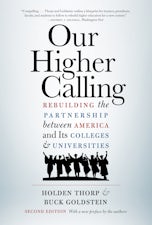Children's Talk in Communities and Classrooms
By Lynne Vernon-Feagans

276 pp., 6 x 9, 14 images, 18 figs., 13 tables, index
-
Paperback ISBN: 978-1-4696-7206-9
Published: June 2022
Buy this Book
This title is not eligible for UNC Press promotional pricing.
Distributed for the University of North Carolina at Chapel Hill Retired Faculty Association
This book traces the transition of a group of poor African-American children in semi-rural North Carolina, who, because of ethnicity and economic circumstances, were at risk for a poor transition to school. Half these children were part of an intensive early daycare intervention program to prepare them for formal schooling and half were not. Through an examination of talk and interviews within their home community and with teachers and peers in the classroom, a portrait is painted of the transition to school of these children and their families. Without purposeful malice from other children or teachers, the children became less successful and more marginalized in the classroom, creating a deceptively benign environment for their less optimal treatment there. This book aims to provide a better understanding of how the culture of the classroom may contribute to children's learning and perception about school, and suggests some helpful strategies for the successful engagement between classroom and child that might create more successful schooling for all children.



